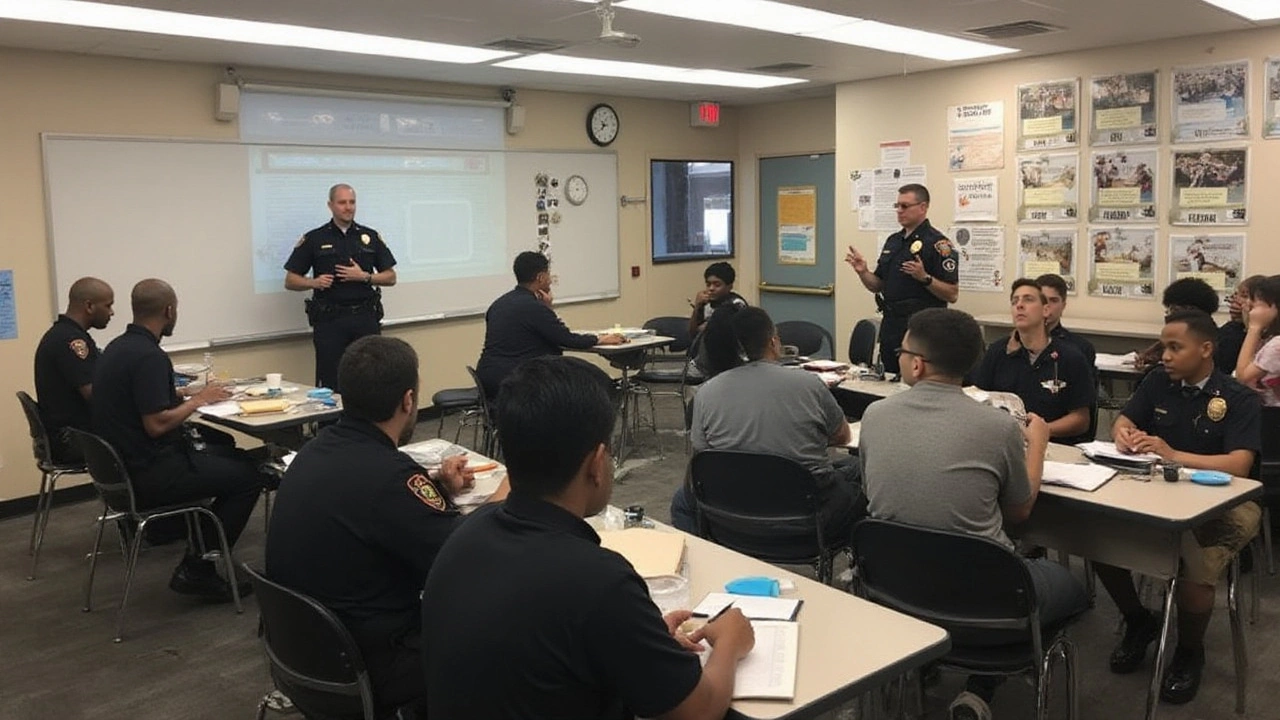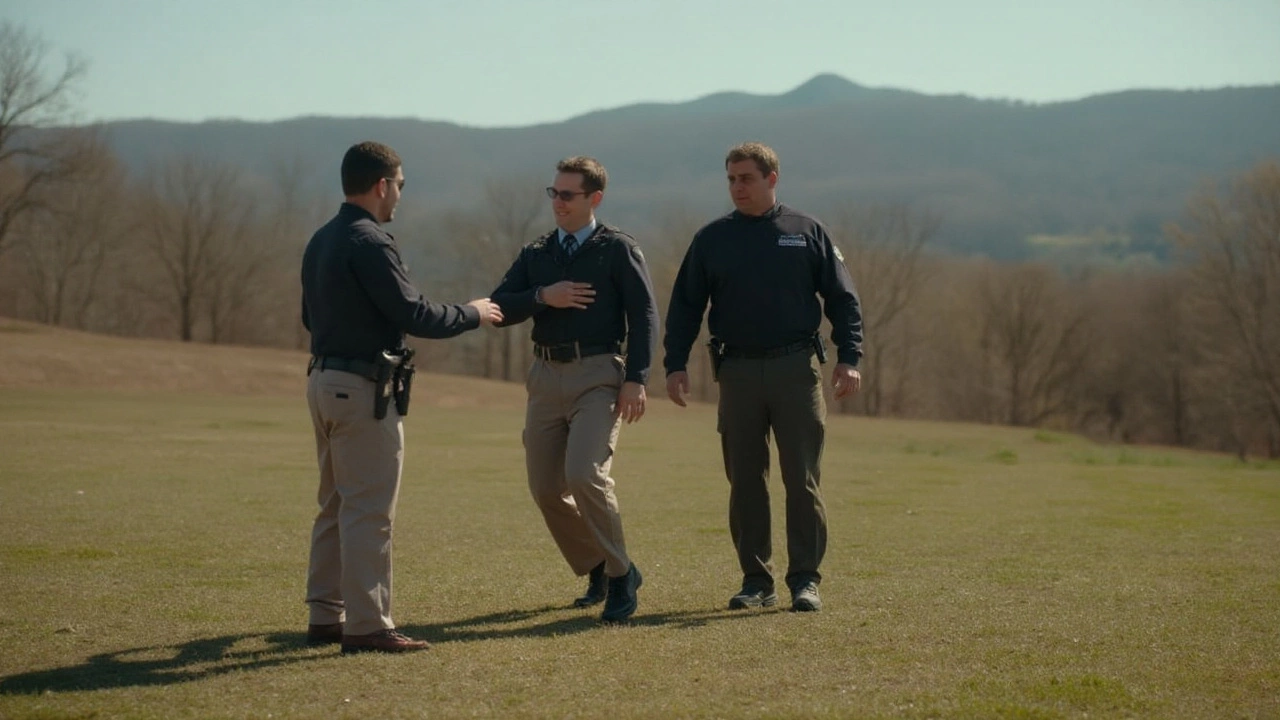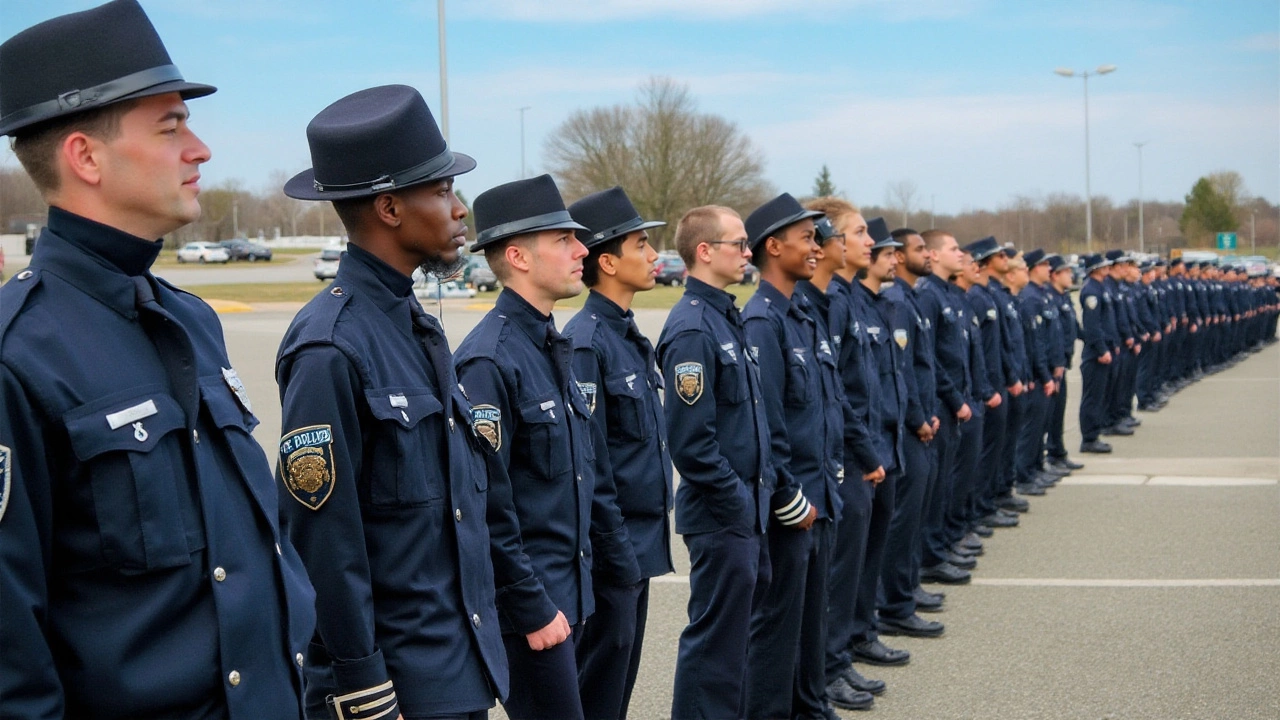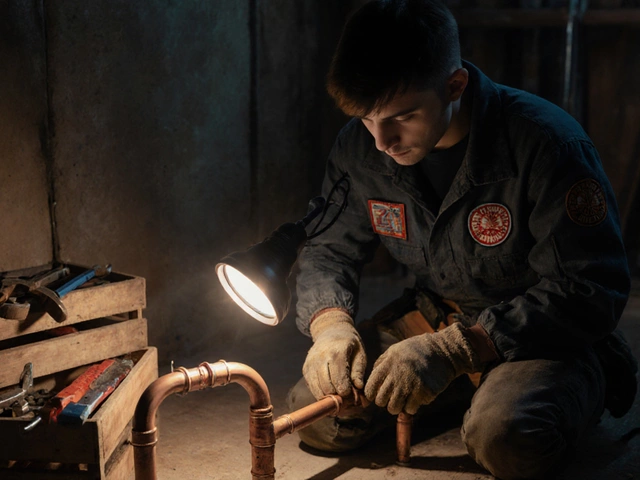Joining the police force is a calling many feel drawn to, seeking to serve and protect their communities. For those looking to become police officers in the state of Pennsylvania, the journey begins with enrolling in a comprehensive police academy training program. This training not only shapes the skills of future officers but also instills them with the values and knowledge essential for the demanding field of law enforcement.
The time spent at the academy is crucial, as it equips cadets with the tools needed for maintaining public safety and upholding the law. In Pennsylvania, understanding how the academy operates and the period of training involved is pivotal for anyone aiming to pursue this noble profession. Through structured learning and physical training, cadets are prepared for the varied challenges they will face in their law enforcement careers.
By exploring the nuances of police academy training, applicants can anticipate what to expect, ensuring they are ready for every part of their training journey. From eligibility criteria to insider tips on making the most of the academy experience, prospective officers can pave a reliable path toward becoming dedicated protectors of their communities.
- Understanding the Importance of Police Academy Training
- Duration and Structure of the PA Police Academy
- Core Components of the Training Program
- Eligibility and Requirements for Enrollment
- Tips for Succeeding in Police Academy Training
Understanding the Importance of Police Academy Training
Police academy training forms the foundation of a career in law enforcement, laying the groundwork for skills and understanding required by every aspiring officer. Imagine it as a preparatory battlefield where cadets are tested, trained, and transformed into fully equipped protectors of their communities. This is where the essence of public service comes to life, combining rigorous instruction with practical experience to mold capable officers from ambitious recruits.
At its core, the police academy in Pennsylvania is designed to address the multifaceted demands of policing. With a focus on both mind and body, the training covers diverse subjects ranging from criminal law, ethics, and community policing techniques to self-defense and firearms proficiency. The extensive curriculum ensures that cadets are not only physically fit but also mentally prepared to handle the intricate challenges faced in daily law enforcement activities. This is crucial because officers must often make split-second decisions that can impact lives and communities.
The importance of the police academy training lies in its ability to instill discipline, resilience, and a code of conduct that defines every officer's duty. In fact, many believe this initial training phase is indispensable for success in the field, as noted by Charles Ramsey, former Philadelphia Police Commissioner, who once remarked,
"The academy is where officers forge the mindset and skills necessary to serve with integrity and courage."Through simulated real-world scenarios and collaborative exercises, cadets learn to work as a team, developing camaraderie and trust among peers that often translates to stronger partnerships on the force.
Moreover, the academy serves as a beacon of change, constantly evolving to reflect societal shifts and new policing methods. Trainers are dedicated to imparting knowledge that goes beyond traditional law enforcement tactics, bringing in contemporary topics like cybercrime, counterterrorism, and community engagement to keep cadets ahead of the curve. As society changes, so too must policing strategies, emphasizing why continuous learning is promoted even after graduating from the academy.
For the aspiring police officer, understanding the significance of academy training can shape expectations and foster a sense of purpose. Police academy training in Pennsylvania isn't just about learning how to uphold the law—it's about becoming an integral part of the community, safeguarding families, and ensuring peace. It's where young men and women are taught to embody the virtues of patience, empathy, and determination. A potent mix of classroom learning, hands-on experience, and disciplined rigour, this training ensures that when cadets finally pin on their badges, they do so with pride, wisdom, and readiness to face the complexities of modern-day policing.
Duration and Structure of the PA Police Academy
Training to become a police officer in Pennsylvania is a comprehensive journey that requires dedication and resilience. The police academy in PA typically spans around six months, offering a detailed curriculum that prepares cadets for the diverse challenges they will face in law enforcement. During this period, trainees undergo intensive physical training, classroom instruction, and scenario-based exercises. This combination ensures that cadets develop both the practical skills and theoretical knowledge needed for effective policing work.
As part of the training duration, Pennsylvania is committed to covering a broad range of topics essential for a successful law enforcement career. Recruits engage in learning modules that address various aspects of policing, including criminal law, ethics, and community relations. The structure of the academy also provides a focus on personal fitness, self-defense tactics, and firearms proficiency. Each topic is designed to build on the next, creating a holistic view of policing that fosters both individual and team capabilities.
A typical week's schedule at the academy is rigorous, demanding both mental and physical agility. Morning sessions often begin with physical training to ensure cadets maintain the fitness levels required of a police officer. This is followed by lectures and seminars covering legal concepts and communication skills vital for day-to-day police interactions. The goal is to ensure that graduates emerge well-rounded, ready to handle the complexities of contemporary law enforcement challenges.
According to John Smith, a veteran trainer at the PA Police Academy, "This training isn't just about learning to enforce laws. It's about becoming part of the community you serve and protect. It's about upholding trust through professionalism and integrity."
The academy training is not just a test of knowledge but also character. Through rigorous assessments and ongoing evaluations, instructors ensure that only the most equipped candidates proceed to active duty. Graduates from the Pennsylvania police academy leave with confidence, knowing they have been trained to the highest standards of policing. Their journey at the academy serves as the foundation for a fulfilling career, paving the way for further specialized training and development within the force.

Core Components of the Training Program
The police academy in Pennsylvania serves as the training ground where aspiring officers are molded into capable law enforcement agents. Each day at the academy is dedicated to honing distinct skills, building both mental acuity and physical endurance. A well-rounded curriculum ensures that future officers are prepared to meet the challenges of the job head-on. At the heart of this training are core components designed to cover all essential aspects of policing.
Physical training is one of the key elements of the program. Cadets are put through rigorous exercises to improve their strength, agility, and stamina. Running, strength training, and endurance exercises are performed to ensure that officers can handle physically demanding scenarios. This aspect of training not only helps maintain fitness but also develops discipline and teamwork among cadets. It can be intense but also rewarding, developing resilience that will benefit officers throughout their careers.
Academic coursework is equally important as the focus is not just on brawn but brains as well. Courses cover a myriad of topics, including criminal law, ethics, and community policing. Such classes are crafted to provide a thorough understanding of the law, guiding officers in making informed decisions in complex situations. This component ensures cadets not only know the law but appreciate the ethical implications, preparing them for real-world scenarios where quick, yet thoughtful decision-making is crucial.
Firearms training is another fundamental segment. Cadets are taught to handle and respect firearms with precision and caution. This includes both classroom instruction and hands-on practice on the firing range. Safety protocols are highlighted to instill an understanding of responsible gun use, and cadets get familiar with different types of firearms they might encounter during their service. This rigorous yet vital training ensures officers are equipped to protect themselves and the public safely.
Practical skills and scenario-based training involve simulations of real-life events. These exercises are designed to enhance problem-solving skills and quick reaction times. Whether it’s handling domestic disputes, traffic stops, or responding to emergencies, cadets are put through various scenarios to sharpen their instincts and responses. This kind of training is essential because it merges theoretical knowledge with practical ability, giving cadets the confidence needed to handle unpredictable situations without hesitation.
Another critical component is communication skills. A police officer's role is as much about interacting with the community as it is about enforcing the law. Communication training sessions are integral as officers must convey authority yet empathy during their interactions. Techniques for effective verbal and non-verbal communication are taught, helping officers to defuse tensions and foster positive community relations. This training highlights the need for officers to serve not just as enforcers but as partners within their communities.
“Understanding the community you serve, not just protecting it, is a cornerstone of effective policing,” notes Chief Inspector Jane Doe of the Pennsylvania State Police. Her words emphasize that building trust within communities is essential for law enforcement success.
A balanced blend of these core components ensures that graduates of the Pennsylvania police academy emerge well-prepared for the responsibilities and challenges of modern-day policing. The training adapts continuously, introducing new elements and refining existing ones to meet evolving community and safety needs. This adaptive curriculum is a testament to Pennsylvania’s commitment to forging a capable and empathetic police force, one ready to serve with integrity and skill.
Eligibility and Requirements for Enrollment
Embarking on the path to becoming a police officer in Pennsylvania involves meeting specific eligibility and requirements that ensure only suitable candidates progress through the training process. High standards are set from the outset to maintain the integrity and competence of law enforcement personnel. Prospective cadets should be ready to demonstrate not only a commitment to public service but also the physical and mental fortitude required in the field. One of the initial steps requires candidates to meet citizenship criteria; applicants must be either U.S. citizens or eligible non-citizens, ensuring they are committed to the values enshrined in the Constitution.
Age-wise, aspiring officers need to be at least 21 years old by the time they complete their PA police academy training, aligning with the legal standards for carrying firearms and performing full police duties. Additionally, a high school diploma or GED equivalent is mandatory, guaranteeing that all applicants have achieved a baseline level of education. A significant expectation is the ability to pass a series of rigorous background checks, which scrutinize any criminal history or discrepancies in character. These checks are in place to maintain the integrity and trust essential for officers.
The selection process also entails a series of personal interviews and aptitude tests designed to measure the applicant's problem-solving skills, ethical decision-making, and interpersonal abilities, all necessary traits for effective policing. Physical fitness assessments form another core component, ensuring that applicants possess the necessary stamina and strength to handle the physical demands of the job. As the police academy in Pennsylvania aims to mold candidates into adept officers, it is imperative to have a foundational level of fitness at the start.
An intriguing aspect of the enrollment process includes psychological evaluations that assess an applicant's mental health and resilience. These evaluations are crucial as they gauge how potential officers may respond to high-pressure situations they will encounter in the line of duty. Notably, a medical examination seals the process, confirming that candidates are in sound health and free from any conditions that may hinder their performance or pose risks to their safety and that of others. Each of these steps plays a pivotal role in shaping a workforce that is both competent and trustworthy.
Financial Considerations and Support
While the journey to becoming a police officer is fulfilling, it comes with financial commitments as well. Police academy attendees in Pennsylvania often face costs related to tuition, uniforms, and essential training materials. However, recognizing the need to support aspiring officers, many law enforcement agencies across the state offer tuition reimbursement programs and scholarships. Such initiatives can considerably lighten the financial load, making the ambition to serve more accessible to a wider array of candidates.
"Preparation is key, not only in terms of meeting the requirements but also in understanding the scope of law enforcement work," says Lieutenant Jones of the Pennsylvania State Police. "Future officers must approach this journey with eyes wide open, ready to engage with both the challenges and rewards of the profession."
The eligibility and requirements laid out for enrollment in the police academy in Pennsylvania serve as benchmarks for potential candidates. By fulfilling these criteria, trustees can ensure that they have laid down a firm foundation for a career marked by integrity, service, and excellence.

Tips for Succeeding in Police Academy Training
Embarking on a journey through the police academy is an exciting yet challenging endeavor. For those looking to thrive in their training, there are several practical tips to keep in mind. To begin with, developing a rigorous physical fitness regimen is crucial. The academy often places high demands on cadets' physical capabilities, so building your stamina and strength beforehand will pay off greatly. Regular exercise routines that include cardiovascular, strength, and endurance training can help prepare you for the intensity of the academy's physical requirements.
Another vital aspect is strong time management skills. Balancing various subjects and activities during the academy requires solid organizational abilities. It's important to create a schedule that allows you to focus not just on classroom learning, but also on reviewing materials and practical exercises. Effective time management will enable you to meet deadlines and stay ahead with your studies, which is essential for success.
It’s equally significant to maintain a positive attitude and closely interact with peers and instructors. Building relationships with fellow cadets can offer moral support and foster teamwork. A strong camaraderie ensures that you can rely on each other for encouragement, advice, and collaboration during challenging times. Moreover, active engagement with instructors provides insights that aren't always found in textbooks. They are valuable resources with a wealth of experience, often offering personalized guidance to help you improve.
"The strength of the team is each individual member. The strength of each member is the team." - Phil Jackson
For those who find themselves struggling with certain academic components, seeking additional resources can be a game-changer. Utilizing online platforms, supplementary reading materials, and even tutoring services can provide alternative perspectives that enhance understanding. It’s important to approach learning with an open mind, willing to explore diverse explanations to grasp complex concepts thoroughly.
A lesser-emphasized area that often proves beneficial is mental resilience training. Police work can be mentally taxing, and the academy is a hard test of this aspect too. Engaging in activities like meditation, mindfulness, or even stress-management workshops can build your mental fortitude, enabling you to handle high-pressure situations effectively.
Finally, setting personal goals aligned with the academy's objectives can keep your ambition in check, serving as motivation during taxing periods. Writing these goals down and reviewing them periodically not only awakens your dedication but also keeps you focused on the aims that drew you to law enforcement in the first place. Such reminders can be powerful motivators when the going gets tough.





Write a comment